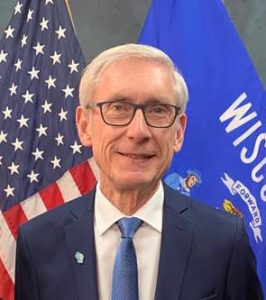 Marquette University Law School Releases New Poll Results
Marquette University Law School Releases New Poll Results
On Wednesday, October 23, Marquette University Law School released its most recent poll results. The poll, which was conducted between October 13-17 among 799 Wisconsin voters, sought public opinion on a range of state and federal topics. The poll indicated good news for Democratic Governor Tony Evers and less optimistic results for Republican President Donald Trump.
Evers’ job approval remains relatively high at 52% with 34% disapproval. This number is down slightly from August, which then indicated a 54% job approval rating. However, the new number is within the margin of error. Additionally, 53% of respondents said the state is headed in the right direction.
Meanwhile, public support in Wisconsin for impeaching Trump continues to rise. In April, 29% of respondents said there was enough cause to impeach. Wednesday’s poll indicates 46% now believe there is enough cause. The number is certainly trending in a direction unfavorable to the President.
Additionally, the poll found Trump loses in head-to-head matchups with Democratic primary candidates former Vice President Joe Biden (Biden 50% – Trump 44%), Senator Bernie Sanders (Sanders 48% – Trump 46%), and Senator Elizabeth Warren (Warren 47% – Trump 46%).
However, Trump’s job approval rating has held relatively stagnant at 46% approval and 51% disapprove.
Other poll findings include:
- Q: Do you support or oppose having a national health plan, sometimes called Medicare-for-all, in which all Americans would get their insurance from a single government plan?
- Support: 51%
- Oppose: 42%
- Q: In 2018, Wisconsin lost nearly 700 dairy farms. Do you think the federal government should financially support small farms that are struggling to stay in business, or is this not the job of the federal government?
- Support small farms: 63%
- Not the job of the federal government: 30%
- Q: Would you support or oppose a mandatory buy back program in which the federal government would require assault weapon owners to turn in those weapons in exchange for payment?
- Support: 42%
- Oppose: 54%
Governor Evers Calls Special Session on Gun Control
On Monday, October 21, Wisconsin Governor Tony Evers signed Executive Order #54, which calls the state legislature into a special session on November 7 to vote on two bills aimed at creating new gun control measures in Wisconsin. By calling a special session, Evers is attempting to force the legislature to vote on the legislation.
“Since taking office in January, I have called on the Legislature to take action and pass commonsense gun safety reform time and time again, giving Republican leadership the opportunity to hear the people of our state and to do the right thing,” Evers said in a statement. “Today I am delivering on my promise to call a special session to address gun violence across our state and I’m calling on Republicans to work with Democrats to get this done.”
The first bill, LRB-4383/4700, creates what is known around the country as a “Red Flag Law”. Essentially, the bill allows a judge to issue a temporary restraining order prohibiting a person who is subject to an extreme risk protection petition from possessing a firearm if the person is substantially likely to hurt themselves or others.
The second bill, LRB-4698/4701, would require universal background checks for any firearm purchase. Specifically, the bill requires a firearms seller to be federally licensed and a background check be run on any prospective buyer. This bill aims to close what’s known as the “gun show loophole” in which a private seller can sell a firearm without having to run a background check on the buyer.
While the bills were rolled out with a lot of media attention, the reaction from the Republican response to the legislation garnered just as much attention. The legislature is not required to take up the bills and Assembly Speaker Robin Vos (R-Rochester) and Senate Majority Leader Scott Fitzgerald (R-Junea) have made it clear they will not.
“A special session call will not change where my Assembly Republican colleagues and I stand on protecting the 2nd Amendment rights of Wisconsin citizens,” Vos told the media. “As I have repeatedly said, we will not entertain proposals that infringe on our constitutional rights.”
Fitzgerald similarly said, “Liberals across the country are upping their rhetoric in support of taking guns from law-abiding citizens. The Senate will not be part of a drawn-out strategy to infringe on constitutional rights.”
At this point, both bills appear to be dead on arrival with neither house leader planning to hold any kind of debate on the legislation.
 Senate Health Committee Approves Pro-Patient Bills
Senate Health Committee Approves Pro-Patient Bills
On Wednesday, October 23, the Senate Committee on Health and Human Services held both an executive session and public hearing on several health care bills.
In particular, the committee voted on and approved Senate Bill 380, that will increase access to telehealth services. Also approved was Senate Bill 28 which enables primary care physicians to engage in direct primary care agreements with patients.
Senate Bill 380, authored by Senator Dale Kooyenga (R-Brookfield) and Representative Amy Loudenbeck (R-Clinton), allows any Medicaid provider to seek and receive reimbursement for services provided via telehealth technology.
In a release, the Kooyenga and Loudenbeck said, “Telehealth is increasingly being utilized to improve access to essential care, but state laws are not keeping pace with advances in technology. Medicaid recipients and providers are currently unable to leverage telehealth’s true potential and we want to change that.”
The bill passed committee on a unanimous 5-0 vote.
Senate Bill 28, authored by Senator Chris Kapenga (R-Delafield) and Representative Joe Sanfelippo (R-New Berlin), allows physicians to engage in direct primary care agreements with patients and clarifies that those agreements are not insurance products.
For a flat fee, patients have access to their doctor for a range of comprehensive primary care services over a specified time period. Primary care services include regular checkups, preventive care, chronic disease management, care coordination, and urgent care.
In a direct primary care practice, patients have a personal relationship with their primary care physician, which diminishes the dependence on more expensive parts of the health care system, such as specialist care, urgent care, emergency rooms, and advanced imaging. According to the American Journal of Managed Care, individuals who receive direct primary care are 52% less likely to enter a hospital than patients with a traditional private practice.
Senate Bill 28 passed on a party line 3-2 vote. Both bills can now receive votes on the Senate floor.
The Senate Health Committee also heard testimony on Senate Bill 416, which seeks to raise Medicaid reimbursement for home health skilled nursing visits by 10%. Medicaid rates for home health care have not been raised in over a decade, which has ultimately led to a workforce shortage crisis. Proponents argue the rates must be raised to attract more nurses to work in home health care. Additional workforce will be vital as home health utilization rates continue to increase.
Individuals from the Wisconsin Association for Home Health Care provided testimony and illustrated the burden and challenge Wisconsin’s home health agencies currently face under the current, outdated Medicaid rates.
The bill was well received by the committee and proponents are hopeful it will receive a vote in the coming weeks.
Stay up to date and get the HC Report delivered directly to your inbox by signing up here.
